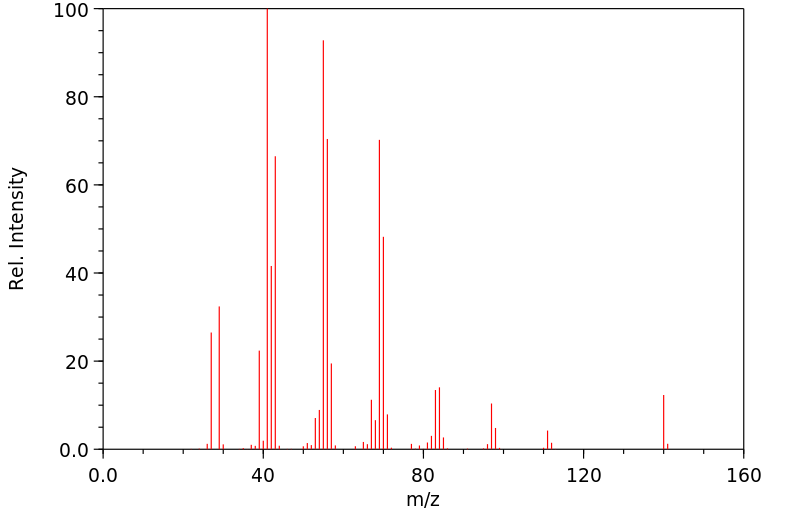3-decene | 19398-37-9
中文名称
——
中文别名
——
英文名称
3-decene
英文别名
dec-3-ene
CAS
19398-37-9
化学式
C10H20
mdl
——
分子量
140.269
InChiKey
GVRWIAHBVAYKIZ-UHFFFAOYSA-N
BEILSTEIN
——
EINECS
——
-
物化性质
-
计算性质
-
ADMET
-
安全信息
-
SDS
-
制备方法与用途
-
上下游信息
-
文献信息
-
表征谱图
-
同类化合物
-
相关功能分类
-
相关结构分类
物化性质
-
熔点:-56.93°C (estimate)
-
沸点:166.82°C (estimate)
-
密度:0.7619
-
保留指数:988
计算性质
-
辛醇/水分配系数(LogP):4.7
-
重原子数:10
-
可旋转键数:6
-
环数:0.0
-
sp3杂化的碳原子比例:0.8
-
拓扑面积:0
-
氢给体数:0
-
氢受体数:0
SDS
上下游信息
反应信息
-
作为反应物:参考文献:名称:一种3,6,6-三甲基-2,4-环庚二烯酮的制备方 法摘要:本发明公开了一种3,6,6‑三甲基‑2,4‑环庚二烯酮的制备方法。3‑蒈烯在CrO3‑Al2O3催化下,与O2于35℃反应24h,生成5‑蒈酮为主要组分的产物Ⅰ,3‑蒈烯转化率约81.3%,5‑蒈酮选择性60.1%;产物Ⅰ在0~1kPa、120℃反应4h,转化为以3,6,6‑三甲基‑2,4‑环庚二烯酮为主要组分的产物Ⅱ,5‑蒈酮转化率100%,3,6,6‑三甲基‑2,4‑环庚二烯酮选择性98.7%;产物Ⅱ减压精馏得到3,6,6‑三甲基‑2,4‑环庚二烯酮,得率大于75%,纯度大于95%。公开号:CN109369360B
-
作为产物:参考文献:名称:使用高达 625 nm 的低能光子在 WO 3– x 上进行光催化控制的烯烃异构化摘要:WO 3– x (W-1) 用于在625 nm 光照射下实现无取代基的线性烯烃的可控光异构化。通过调节烯烃的碳链长度获得热力学和动力学异构体。末端烯烃转化为异构化产物,石油衍生物中存在的内烯烃混合物转化为有价值的纯烯烃产品。W-1 中的氧空位 (OVs) 改变了 W-1 的电子结构以提高其捕光能力,这说明了在高达 625 nm 的光照射下烯烃异构化的高活性。此外,W-1 表面上的 OVs 产生了不饱和的 W 5+与烯烃协调有效吸附和活化烯烃的位点。机理研究表明,在原位从协调的不饱和W的协调形成表面π络合物和π-烯丙基W¯¯中间体原产5+网站和烯烃确保W-1的高光催化活性和选择性烯烃的光催化异构化通过一激进的机制。DOI:10.1016/s1872-2067(21)63815-9
文献信息
-
Trial for anti-Markovnikov Hydration of 1-Decene Using Platinum Complexes Bearing a PBP Pincer Ligand, Inducing Alkene Isomerization and Decomposition of PBP Ligand作者:Hayato Ogawa、Makoto YamashitaDOI:10.1246/cl.131208日期:2014.5.5Mixing of [(PBP)PtCl] complex with 1-decene and H2O afforded isomerized alkenes. Deuterium-labeling experiment indicated the catalytically active hydride species for alkene isomerization formed from water and [(PBP)Pt] complex. Reaction of [(PBP)PtNTf2] with H2O gave a platinum hydride complex having PNNP ligand with a loss of boron atom, but the resulting complex showed low catalytic activity. Two types of cationic platinum hydride complexes were suggested as active species for alkene isomerization.
-
Metal-Ligand Core-Shell Nanocomposite Catalysts for the Selective Semihydrogenation of Alkynes作者:Takato Mitsudome、Yusuke Takahashi、Satoshi Ichikawa、Tomoo Mizugaki、Koichiro Jitsukawa、Kiyotomi KanedaDOI:10.1002/anie.201207845日期:2013.1.28Catalysts with a sheltered upbringing: Novel core–shell nanocomposite catalysts consisting of active metal nanoparticles encapsulated by macroligands have been prepared. They have Pd nanoparticles (PdNPs) as an active core and shell ligands having sulfoxide moieties coordinated to the PdNPs. The shell protects the catalyst from coordination by alkenes and allows the lead‐free selective semihydrogenation
-
Effect of the presence of ionic liquid during the NiMoS bulk preparation in the transformation of decanoic acid作者:Géraldine Leyral、Soizic Brillouet、Julie Rousseau、Frédéric Richard、Anne Sophie Mamede、Laurence Courthéoux、Annie Pradel、Michel Ribes、Sylvette BrunetDOI:10.1016/j.apcata.2016.12.020日期:2017.2The impact of the presence and amount of [BMIM][NTf2] ionic liquid during the preparation of bulk NiMoS catalysts was investigated. It was clearly shown that these factors have a strong influence on both the morphology and specific surface area of the obtained NiMoS samples. Most interestingly the catalytic activity for the transformation of decanoic acid increased up to three times when IL was present
-
Acid-catalysed carboxymethylation, methylation and dehydration of alcohols and phenols with dimethyl carbonate under mild conditions作者:Saimeng Jin、Andrew J. Hunt、James H. Clark、Con Robert McElroyDOI:10.1039/c6gc01826b日期:——Dimethyl carbonate (DMC) chemistry has been extended to include acid-catalysed reactions of different aliphatic alcohols and phenols. For the first time, p-toluenesulfonic acid (PTSA), H2SO4, AlCl3 and FeCl3 have been...
-
The metathesis of α-olefins over supported Re-catalysts in supercritical CO<sub>2</sub>作者:Maurizio Selva、Alvise Perosa、Massimo Fabris、Patrizia CantonDOI:10.1039/b815121k日期:——At 35 °C, in the presence of supercritical carbon dioxide (80–150 bar) as a solvent, α-olefins (RCHCH2, R = C4–C6) undergo highly selective self-metathesis catalyzed by supported Re-oxide (7%). To the best of our knowledge, this is the first procedure for the metathesis of alkenes, in which heterogeneous catalysts are combined with the use of dense CO2. The intrinsic eco-compatibility and the unique在35°C下,在超临界条件下 二氧化碳 (80–150 bar)作为 溶剂,α-烯烃(RCH CH 2,R = C4-C6)经历高度选择性的自复分解 被支持催化 再氧化(7%)。据我们所知,这是复分解 烯烃,其中不均一 催化剂结合使用高浓度的CO 2。这种介质固有的生态兼容性和独特的理化特性既具有环境优势,又具有合成优势:不仅具有常规毒性溶剂(例如正庚烷 和 甲苯)可以更换,但反应更快。例如,在2小时后,1-辛烯在scCO 2中分别为67%和40%,正庚烷, 分别。自我甲基化的产物,7-十四碳烯可以分离,产率最高可达68%。在90 bar的压力下,该反应对溶剂的摩尔分数相当敏感。烯烃(在scCO 2中);但是,超临界介质压力(和密度)的增加不会对过程的速率或选择性产生明显影响。的性质催化 支持也会极大地影响反应结果: 再氧化示出了良好的活性,如果分散在γ-Al系2 ö 3,而硅石基于基础的系统无效。
表征谱图
-
氢谱1HNMR
-
质谱MS
-
碳谱13CNMR
-
红外IR
-
拉曼Raman
-
峰位数据
-
峰位匹配
-
表征信息
同类化合物
高密聚乙烯
香叶醇
顺式3-甲基-2-己烯
顺式-5-癸烯
顺式-5-甲基-2-己烯
顺式-5-庚烯-1-炔
顺式-4-癸烷
顺式-4-甲基-2-戊烯
顺式-4-甲基-2-戊烯
顺式-3-癸烯
顺式-3-甲基-3-己烯
顺式-3-甲基-2-庚烯
顺式-3-戊烯-1-炔
顺式-3,4-二甲基-3-己烯
顺式-3,4-二甲基-2-戊烯
顺式-3,4-二甲基-2-戊烯
顺式-2-甲基-3-己烯
顺式-2-壬烯
顺式-2-丁烯-D1
顺式-1.1.1-三甲基-2-丁烯
顺式-1-甲基-2-环丙基乙烯
顺式-1-甲基-2-乙烯基环戊烷
顺式-1-环戊基-1-辛烯
顺式-1-氘代-3-甲基-1-丁烯
顺式-(9ci)-2,3,3a,7a-四氢-4-(1-甲基乙基)-1H-茚
顺式-(2-丁烯基)环丙烷
顺式,顺式-2,4-己二烯
顺-环辛烯
顺-9-二十一碳烯
顺-6-十三碳烯
顺-5-甲基-1,3,6-庚三烯
顺-4-辛烯
顺-4-壬烯
顺-3-辛烯
顺-3-甲基-2-戊烯
顺-3-壬烯
顺-3-十三碳烯
顺-2-辛烯
顺-2-癸烯
顺-2-戊烯
顺-2-庚烯
顺-2-己烯
顺-2-丁烯
顺-2,2-二甲基-3-己烯
顺-1,3-戊二烯
顺,顺-1,9-环十六烷二烯
顺,顺,顺-环癸-1,3,5-三烯
间戊二烯
间二(4-吡啶基)苯
镁,二-2-丁烯基-







